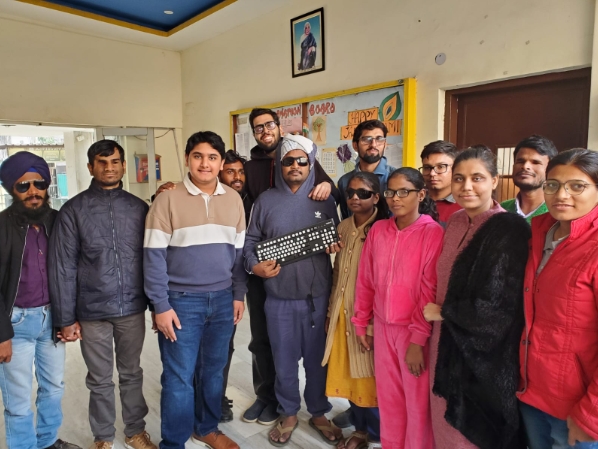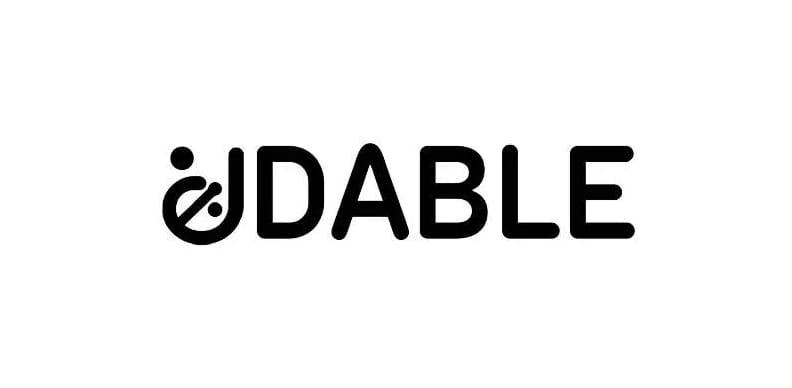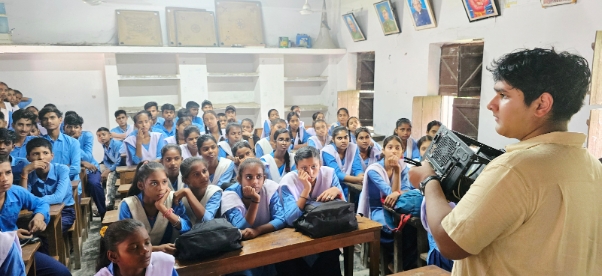
Princeton, NJ – August 1, 2025 – In a world where innovation shapes the future, one high school student is making a meaningful impact by creating technology designed not just for progress—but for inclusion. Umang Sharma, a senior at Princeton Day School, is being recognized nationally and internationally for his groundbreaking work in assistive technology, including the development of a low-cost Braille keyboard aimed at empowering individuals with visual impairments.
From an early age, Umang’s curiosity with robotics and artificial intelligence laid the foundation for a journey deeply rooted in purpose. What started as a passion for coding has evolved into a mission to make technology accessible to those who need it most. His Braille keyboard project, which has garnered widespread media attention and impact letters from organizations such as the National Association for the Blind (NAB) Delhi and Silver Linings, is a prime example of how innovation and empathy can intersect.
“Technology should be a tool that uplifts everyone, not just a select few,” said Umang Sharma. “My goal is to develop solutions that address real-world problems, especially those faced by individuals with disabilities.”
The affordable Braille keyboard was featured in multiple news outlets, including Indian Express Edex Live, Udaipur Times, Pressnote, Royal Harbinger, Rajasthan Patrika, and Bharat First, recognizing Umang’s contribution to inclusive design and accessibility. The innovation has also been officially acknowledged by the Indian Patent Office, demonstrating the tangible value and originality of his work.
In addition to his technical achievements, Umang maintains a strong academic record and a vibrant extracurricular portfolio. As Secretary‑Treasurer of the Student Council and Co‑head of both the Pickleball Club and Makers’ Club, he leads workshops for the Computer Science Club, combining his love for learning with a dedication to helping others grow.
Beyond developing innovative solutions, Umang is also committed to empowering the next generation of tech enthusiasts. Through 1-on-1 strategy calls, he offers personalized guidance to fellow students and young innovators, helping them refine their ideas and navigate challenges in their projects. This mentorship initiative underscores his broader vision of community-driven growth in technology and social entrepreneurship.
“Whether it’s designing assistive devices or mentoring others, I believe innovation should be collaborative,” Umang adds. “When we work together to solve problems, we create better outcomes for everyone.”
Looking ahead, Umang plans to expand his work in accessible tech, continue his mentorship programs, and explore new ways to merge machine learning with practical, life-enhancing applications. His platform, www.umangsharma.xyz, offers updates on his latest projects, media appearances, and booking information for consultations.
Founder of Jdable: Scaling Assistive Technology for the Visually Impaired

As Founder & CEO of Jdable, a registered nonprofit with tax‑exempt status in New Jersey, Umang leads a 50‑person global team, including students and faculty from institutions such as Harvard, University of Pennsylvania, and University of Illinois Urbana-Champaign. Jdable’s mission is simple but profound: make assistive technologies widely available to those who need them most.
To date, Jdable has impacted over 1,000 disabled individuals and 100,000 people worldwide through device distribution, outreach events, and educational initiatives focused on disability empowerment. Recently, the organization expanded its reach by acquiring two companies—one focused on software for its AI-powered autonomous wheelchair and another on custom hardware development—allowing it to design and deliver fully integrated assistive tech solutions in-house.
Jdable’s rapidly expanding product line includes:
- Low‑Cost Braille Keyboard – Currently used by 500+ students in the USA, India, and Finland, with an additional 150+ units in production. This game-changing device reduces costs from $7,000 to just $10.
- Autonomous Wheelchair – Equipped with LiDAR and AI for self-navigation in public spaces, also offering joystick override and emergency stop features.
- IoT Smart Cane – Features GPS tracking, obstacle detection, haptic feedback, and smartphone integration.
- Braille Maps & Globes – Designed for tactile geography learning.
- Braille Shapes – Accessible 2D/3D geometry sets for inclusive math education.
Each of these products has gained recognition from global media and disability advocacy organizations alike. “With Jdable, my mission is to ensure that innovation reaches those who need it most—no matter where they live or what resources they have,” says Umang.
PC‑Workshop.org: Bringing Emerging Tech to Rural Bihar

In addition to his work on assistive technology, Umang is breaking barriers in technology education through PC‑Workshop.org, a grassroots initiative designed to bring hands-on tech training to underserved rural communities.
In the villages of Riga and Lahladpur in Bihar, India—regions where many students have never seen a computer—Umang personally led immersive tech workshops for more than 300 students. The workshops introduced participants to:
- PC Building 101
- Virtual Reality
- Artificial Intelligence Basics
- Emerging Technologies, including several of Umang’s own innovations
More than just technical tutorials, the sessions sparked inspiration. “The goal wasn’t just to show them technology—it was to make them believe they could build it, too,” says Umang. Several students expressed a new excitement for learning about tech and engineering after the sessions.
Cognitive Composting: AI + Behavioral Science for Food Waste Reduction
Umang’s commitment to social good extends into sustainability research as well. His latest project, Cognitive Composting, merges computer vision with behavioral science to reduce cafeteria food waste in schools.
Using a Raspberry Pi and an Intel RealSense camera, Umang developed a system to track and analyze food waste in real time. He then implemented behaviorally informed interventions—like goal setting, social proof, and loss aversion—to influence student decision-making. The result? A 37% reduction in food waste at his own school within just five days.
The project has earned praise from environmental advocates and science fair judges alike, showcasing how tech-savvy youth can tackle even the most overlooked challenges.
Mentorship, Recognition, and What’s Next
From mentoring students globally through Jdable’s internship program (5% acceptance rate, 300+ applicants) to winning major hackathons like UPenn PClassic, PantherHack, and HackBAC, Umang’s work has not gone unnoticed.
His accolades include:
- 1st Place, UPenn PClassic
- APA Special Award for Psychology
- Best Social Hack & Best Hardware Hack, PantherHack
- 3rd Place, HackBAC
- Presidential Volunteer Service Gold Award
- Princeton Day School Silver Service Award
In the year ahead, he plans to:
- Expand Jdable’s reach to new global communities
- Launch additional PC‑Workshop.org training hubs
- Scale Cognitive Composting for school-wide adoption
- Continue mentoring young innovators worldwide
In a time when much of the tech industry focuses on speed and scale, Umang Sharma is choosing impact—creating tools not just for profit, but for purpose. With a heart for service and a mind for innovation, he’s proving how youth‑led innovation can change the world.
For media inquiries, please contact: Umang Sharma
Email: umang@sharma.com (personal) | umang@jdable.org (nonprofit)
Websites: www.umangsharma.xyz | www.jdable.org | www.pc-workshop.org
Media Contact
Company Name: Jdable
Contact Person: Umang Sharma
Email: Send Email
Country: United States
Website: http://umangsharma.xyz/
